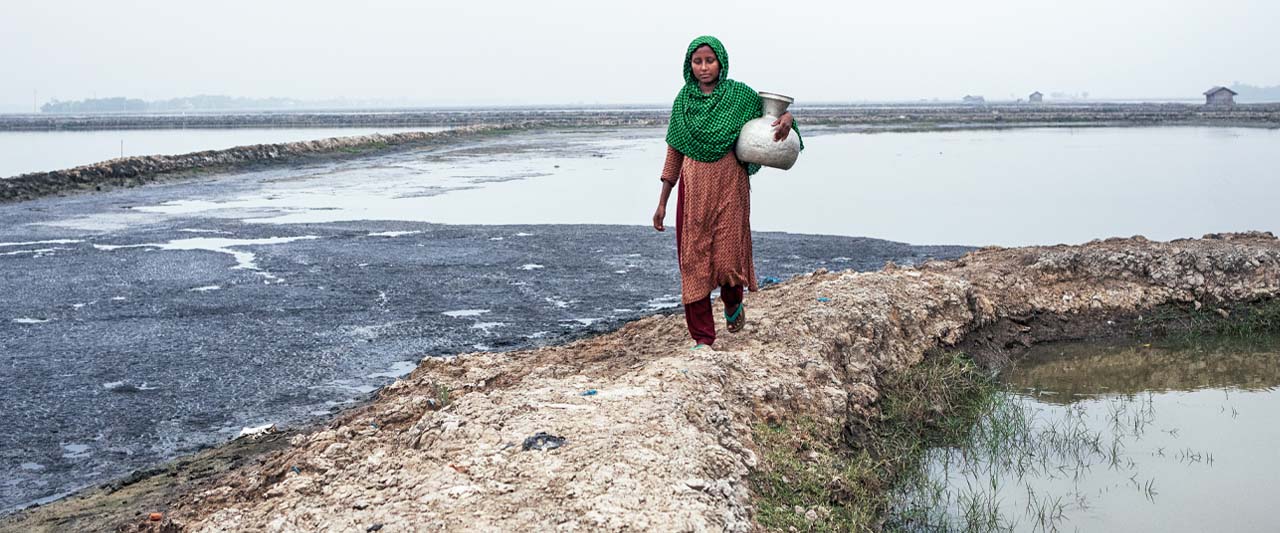Study
Published in Sage Journals
A qualitative study by Ipas Bangladesh reveals how extreme weather events (EWEs) caused by climate change worsen sexual and reproductive health and rights (SRHR) outcomes for women and girls in coastal Bangladesh. The study shows that people’s experiences during climate crises vary. Factors like gender, age, marital status, religion, income level, and social background shape them. The study found that effects such as increased gender-based violence, unintended pregnancies, challenges with menstrual health, and difficulties in accessing health services vary widely based on these intersectional factors.
“This is one of the first studies that systematically links climate vulnerability with SRHR outcomes through an intersectional climate justice lens in Bangladesh,” says Dr. Sayed Rubayet, Country Director, Ipas Bangladesh. “By intersecting SRHR, gender equity, and climate resilience, the study advocates transformative approaches beyond infrastructural issues to address structural inequalities and ensure inclusive, rights-based climate adaptation strategies.”
Key Findings
- Environmental changes lead to health, economic, environmental, and social disruption: Community members reported noticeable environmental changes, including increased frequency of cyclones, flooding, rising water salinity, riverbank erosion, temperature increase, and changes in seasons, and related them to climate change. These events are linked with health, economic, environmental, and social disruptions. Their understanding of climate change varied due to limited access to accurate information.
- Gender norms and intersectional factors disproportionately affect women in the climate crisis: Women and girls are disproportionately affected by the climate crisis due to patriarchal gender norms and social expectations. Their vulnerabilities are intensified by intersecting identities such as age, marital status, disability, religion, and poverty. Restrictions on mobility, decision-making, and economic participation increased women’s exposure to climate-related risks and reduced their ability to adapt.
- Climate crises severely impact SRHR: Climate events cause more unintended pregnancies due to disrupted contraceptive access and heightened exposure to gender-based violence in shelters.Child marriage, forced abortion, and reproductive coercion are reported as coping strategies. Menstrual health is compromised by a lack of supplies, privacy, and clean water. Access to menstrual regulation services is often disrupted due to the unavailability of service providers and damaged infrastructure.
- Communities adopt local solutions in the climate crisis, but with limitations: Community members reported adopting various local strategies to cope with SRHR challenges brought on by climate-related crises. These included health workers storing contraceptives in advance, offering mutual support during evacuation and recovery, and making personal sacrifices, such as skipping meals, to care for children or elderly family members. However, in some cases, people’s options for coping were limited by structural inequalities and led to harmful compromises, including early marriage and engaging in sex work to survive.
Recommendations for building climate resilience
Participants called for transformative solutions to strengthen climate resilience, including:
- Integrating SRHR services into disaster response.
- Improving access to contraception and menstrual regulation services during emergencies.
- Ensuring cyclone shelters meet the needs of all genders
- Addressing gender inequality and involving local women and youth in planning and implementing SRHR programs.
- Supporting local solutions that help communities cope better with the effects of climate change.
- Making sexual and reproductive health services more accessible.
The study emphasizes that climate resilience cannot be achieved without addressing sexual and reproductive health and rights.
“We learnt that to help communities cope better with extreme weather events, we need resilience plans that are inclusive, fair, and based on people’s rights. This means making sure women and girls, especially those from marginalized groups, are part of the planning and preparation of climate policies and preparedness plans,” says Dipika Paul, Sr. Advisor, Research, Monitoring and Evaluation, Ipas Bangladesh and principal investigator of this study. “It also stresses the importance of including sexual and reproductive health services and tackling gender inequality in climate preparedness and response efforts.”


